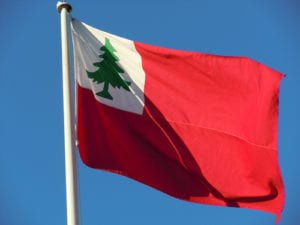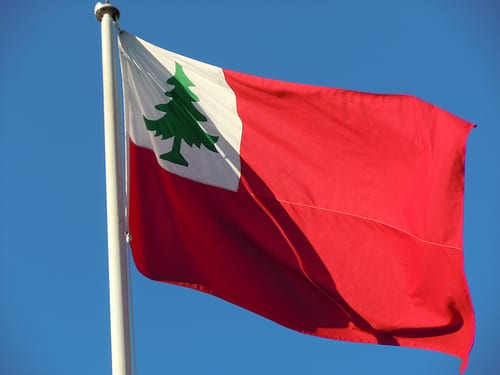 I have an odd relationship with the Town of Weare, a place of rebellion.
I have an odd relationship with the Town of Weare, a place of rebellion.
Weare is where I was arrested–Where? Weare!–in 2010 for filming police officers during a routine traffic stop. I was charged with felony wiretapping, facing 7 years in prison. All charges against me were later dropped, but I, like Ebenezer Mudgett and his posse did centuries ago, decided to fight back. I sued the police department and the Town of Weare for violations of my constitutional rights, and in 2014 prevailed in a landmark 1st Amendment case in the First Circuit Court of Appeals.
Today is the anniversary of Weare’s Pine Tree Riot of 1772, which took place 17 months before the Boston Tea Party and three years before “The Shot Heard Round the World.”
You can read more of the history here, but the gist is the British Crown overreached by mandating that New Hampshire white pine trees of a certain size remained the property of the King of England. You see, England had a navy and these ships needed masts. England had also greatly deforested its lands by now, so, like good overlords, decided to steal stuff they needed to invade and kill and wage war from the colonialists who were trying to get away from it all.
“In 1771 Governor John Wentworth was appointed a ‘Surveyor of the King’s Woods’ and he appointed deputies that traveled throughout the state, enforcing the law. They searched saw mills, marked any trees in the mill that should have been reserved for the king with a ‘broad arrow mark,’ confiscating them for sale with the proceeds going into the King’s treasury. Following the posting of an advertisement in the newspaper, if the matter was not settled, the offending saw mill owner and any others involved were arrested, often tried in court, and fined.
A new settler, before he could build his cabin and clear his land, had to get a deputy to put the broad arrow mark on all the king’s pine trees that were to be kept for masts, and then a royal license to cut the rest, for all which he had to pay a good sum.”
The Weare settlers were having none of it, rightly thinking that trees grown and logged on their own properties should be dispersed of as the owners saw fit, to be used for their houses and churches, and to sell for profit.
On April 13, 1772, twenty men with blackened faces entered the Surveyor of the King’s Woods hotel room where he was meeting with Ebenezer to arrange bail. They brought switches and beat the sheriff and his sidekick, driving them out of town to jokes and jeers.
Eight Pine Tree “rioters” were eventually brought to court, charged with being rioters and disturbing the peace, and “making an assault upon the body of Benjamin Whiting, Esq. Sheriff, and that they beat, wounded and evilly mistreated him and other injuries did so that his life was despaired of.” They were also charged with going “against the peace of our Lord the King, his crown and dignity.” This last one sounds familiar to me, since I was also charged with “Obstructing Government Administration,” a catch-all misdemeanor like “Disobeying an Officer” (another charge I received that was later dropped).
The court justices levied light fines against the “rioters” and set the men free, demonstrating that the judges, local boys, did not approve of the law any more than the men who logged the trees.
“Seventeen months later, another group of men, their faces blackened and painted would dump tea into Boston Harbor. Had they perhaps heard of these courageous men of Weare, and followed their lead?
Taxation without representation, the stamp act, the tax on molasses, the law that all exports should be sent to England and that England should furnish all the imports, the attempt to govern by force and the quartering of troops on the people roused the colonists to armed resistance. The Shot Heard Round the World was sounded on April 19, 1775.”
What can I say? New Hampshirites have a stroppy streak when it comes to freedom and private property. This is just one of hundreds of reasons why the “Live Free or Die” state was selected as the home of the Free State Project.
I’m not the only one stirred by this revolutionary history. One of New Hampshire’s best local breweries is named Able Ebenezer, its origin and brand inspired by the Pine Tree Riot.
Later today, courtesy of Americans for Prosperity-New Hampshire, I will hoist a glass to commemorate one of the earliest acts of American resistance against British tyranny and celebrate the 244th anniversary of the Pine Tree Riot. From AFP-NH:
“Long a symbol of centralized government overreach, the Pine Tree Riot was a testament to the spirit of independence, freedom, and the New Hampshire way of life. Therefore, it is fitting that the celebration of the anniversary of the spark of the American Revolution takes place during the same week as the day Americans are forced to hand over their hard earned money to an overgrown federal government.
Be a part of a liberty loving community who will hear from distinguished speakers about the importance of standing up for freedom and opposing the encroachments of our rights by an ever-growing government. Refreshments will be served.”
The event takes place at Weare Town Hall Public Meeting,16 North Stark Highway from 6-8PM. Sound like fun?


The Weare Historical Society is celebrating and commemorating the 250th annivery of the Pine Tree Riot on Saturday, April 9, 2022 in Weare Center, Weare, NH We are welcoming any descendants of the “rioters” to be our honored guests. We already have some who have committed, descending from Mudgett, Quimby, Worthley, Tuttle. Be part of history! http://www.PineTreeRiot250.com